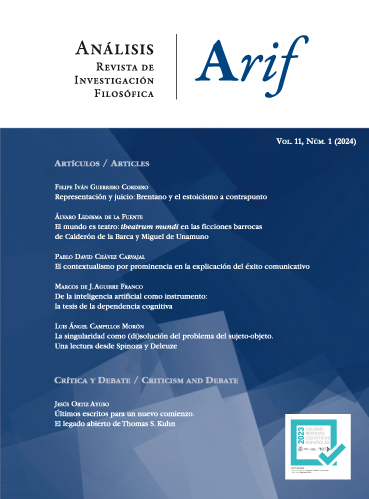Salience-based Contextualism in the Explanation of Communicative Success
DOI:
https://doi.org/10.26754/ojs_arif/arif.2024110313Abstract
This article analyzes how people interpret the meaning of utterances used in conversations, particularly when the meaning of words changes depending on the context. It focuses on a version of a theory called prominence-based contextualism, which explains how speakers understand the meanings of key expressions used in conversation. The article argues that the ability of interlocutors to comprehend what a speaker meant at a specific moment (communicative success) depends on their understanding of the most prominent meaning of the words used. This understanding is determined by the situation in which the words were spoken, and it does not require knowing the speaker's communicative intention. The theory of salience contextualism proposes a word meaning formulation based on five sources of information: beliefs about the world, the meaning of words and sentence structure, the speech situation, the properties of the human inferential system, and stereotypes and presuppositions about society and culture.
Downloads
Downloads
Published
How to Cite
Issue
Section
License
Copyright (c) 2024 PABLO DAVID CHAVEZ CARVAJAL

This work is licensed under a Creative Commons Attribution-NonCommercial-NoDerivatives 4.0 International License.
Los autores que publican en esta revista están de acuerdo con los siguientes términos: los autores conservan los derechos de autor y garantizan a la revista el derecho de ser la primera publicación del trabajo al igual que licenciado bajo una Creative Commons Reconocimiento-No Comercial-Sin Obra Derivada 4.0 (CC BY-NC-ND) que permite a otros compartir el trabajo con un reconocimiento de la autoría del trabajo y la publicación inicial en esta revista. Los autores pueden establecer por separado acuerdos adicionales para la distribución no exclusiva de la versión de la obra publicada en la revista (por ejemplo, situarlo en un repositorio institucional o publicarlo en un libro), con un reconocimiento de su publicación inicial en esta revista.






